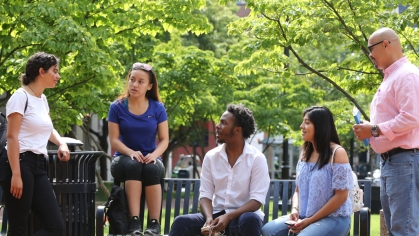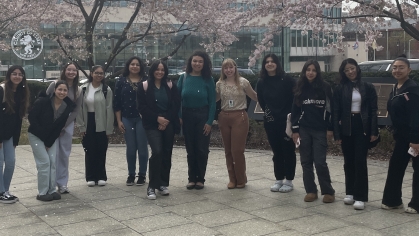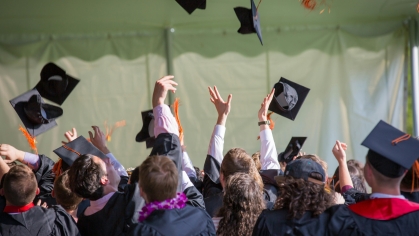The Promise You Bring of Empathetic Citizenship
First let me say a simple but deeply felt welcome from all of us at Rutgers-Newark and in this great city of Newark. I think it is fair to say that looking out at the array of your faces, hearing just now who is in this room, and knowing the many paths that you have travelled to get here, and the commitments you have made all along the route to pursue your education in the service of not just private gain but public good, gives us hope in what are admittedly trying times for us all, for our nation, and our world. Yes, you are here to be educated, in fields from arts & sciences to business, criminal justice, and public administration, in ways that will open up new opportunities for you and your future. You are also here, at Rutgers-Newark and in Newark, to experience a community of scholars and citizens as broadly diverse as the fields you will study, in ways that will open your eyes and minds and hearts to the range of answers to the question, “who am I?” and the many possible selves you can become.[1] Indeed, you are the next diverse generation of leaders, professionals, citizens, that this world so needs!
And, as if learning new disciplines and ways of being a person weren’t enough, you are also here very specifically because WE need you. You have the best chance of perfecting a skill-set sorely missing in our democracy, but one for which I believe the many paths you have travelled to get here give you a head start on showing us all the way. I call that much-needed skill set of a good democracy, empathetic citizenship. This, by the way, is a skill set that has nothing to do with who someone in Washington labels as an American or not. We at Rutgers-Newark are especially proud of our Dreamers and the paths they have travelled to get an education and contribute to the vibrancy of our community and country. We are proud of those who would travel here for an education from countries now banned by a false equation of faith and extremism. And we will stand in firm support of them, as we will with others who unfairly get labelled in the cross-hairs of those who would exclude rather than include, as any worthwhile democracy should do.
Now, let me return to empathetic citizenship. I see it as the ability and proclivity to be a (real) citizen by recognizing one’s interdependence with others, those (apparently) similar to us and those (seemingly) different. Just look at the acts of humanity shown our brothers and sisters hit by Hurricane Harvey at home or by devastating mudslides in Sierra Leone abroad. These are heroic acts in the face of natural disasters that can also be the basis for everyday acts of empathy if we come together going forward.
Everyday empathetic citizenship involves the willingness to step inside others’ boots in ways that draw us closer together, while also sharpening what we know about who we are and what we believe and how we will practice it. For as we develop the bonds of empathy with others, we also feel their gaze on us, and come to learn about ourselves too, especially what we look like to others. In my field of social psychology, we call it the looking-glass self, a mirror that lets us all grow stronger.
Now, let’s be clear, none of this will be easy, especially the perfecting of the skills of empathetic citizenship, and the acknowledgement of how we are perceived by others. Just looking at the tragedy that occurred on the campus of the University of Virginia and in Charlottesville, we surely are reminded of how hard it is for this society to rid itself of the legacy that moves people to reject empathy in favor of supremacy. We hope never to see such hatred at Rutgers-Newark and in our dear city of Newark. Yet even here, we know the struggle for justice is a constant. We are coming upon the 50th anniversary of calls for justice in our university -- the Black Organization of Students’ takeover of Conklin Hall and the creation of the Minority Student Program in the Law School. And we join the City of Newark in marking 50 years since the Newark rebellion with awe for the bravery and the resilience against oppression of the citizens of Newark. Reflecting these intertwined histories and our continuously renewed commitment at Rutgers-Newark to not just be diverse but to leverage the strength of our diversity, we have just been named as one of ten sites in the country for a Truth, Racial Healing, and Transformation Center. Clearly, that will be a place for you to hone the skills of empathetic citizenship as we all join together, campus and community, to remember the lessons of the past in ways that push toward a more just, harmonious, and constructive future.
In committing to this work we acknowledge that the promise of a real, vibrant, just democracy lies in its fabric of interdependence, person to person, group to group. A multi-colored, multi-textured, multi-purpose fabric of associations that celebrates difference without presuming to judge who and what is better, and that lifts up common purpose in ways that acknowledge we are all better off together – it is too hard and lonely to do it alone, and much more rewarding to live and learn and play and even suffer, together.
So here’s to the beginning but never the end of your work, our work, together, in a spirit of Rutgers-Newark pragmatism, sprinkled throughout with the idealism of our hearts and minds, and the joys of doing it as one. We wish you the best for the coming year here at Rutgers-Newark in and of the fine city of Newark. We are thrilled to have you join us full of the promise you bring to this wonderful community.
And speaking of this remarkable city, our home, let me call now to the podium, a man who truly knows what empathetic citizenship is all about and who, when elected mayor, said, “when I’m the mayor, you’re the mayor,” and who lives by that dictum of everyday ethics, each and every day – please welcome, the Honarable Ras J. Baraka.
[1] Oyserman, Daphna, and Hazel Rose Markus. 1993. The sociocultural self. In Psychological perspectives on the self (Vol.4), ed. Jerry Suls, 187-220. Hillsdale, NJ: Earlbaum.


